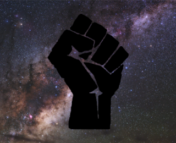It’s #BlackInPhysics week Oct. 25th to Oct. 31st, 2020! Find out more and follow along at blackinphysics.org and @BlackInPhysics on Twitter. This post is also part of our ongoing series #BlackInAstro. For our cornerstone post, see here.
In this installment, we are publishing an interview with Dr. Sian Proctor. She’s a geoscientist, science communicator, artist, author, analog astronaut, and all around space exploration enthusiast!
Sian Proctor is an explorer. Her formal education covered multiple disciplines (environmental science, geology, science education), but that doesn’t even begin to describe her incredible career. She has worked as a community college professor for over twenty years, teaching geology, sustainability, and planetary science. She has developed a curriculum on the science of disasters for FEMA. She creates art to inspire women of color in astronomy and aerospace. She is a Major in the Civil Air Patrol. She is an analog astronaut, having completed four different missions to prepare for future crewed spaceflight. She has done multiple TEDx talks (see below for one of them on impostor syndrome!), and even written a cookbook. The list goes on and on.
All these successes didn’t come without difficulty and a lot of hard work, though. Dr. Proctor describes how “being Black has meant working twice as hard and being careful not to mess up. I could tell that professors had low expectations for me. They didn’t necessarily want to invest in helping me or mentoring me for whatever reason. I didn’t have any Black female science professors and there weren’t any other Black females in my science classes.” Nevertheless, this didn’t stop her. “I think being a Black scientist has made me determined, resilient, and creative. You have to push to be noticed and taken seriously.” She responded to this pressure by “digging in and proving I belong. Eventually, you just wear them down and succeed through grit and determination.”
In addition to her creativity and resilience, the common thread through all of her work is her passion for exploration, particularly space exploration. In her own words, “I found space exploration through being a geoexplorer and getting out and investigating our amazing planet. I always loved airplanes so I got my pilot license. I got SCUBA certified. I basically lived the life of an explorer and that set me up for applying to be a NASA astronaut and I turned into an analog astronaut living in Moon and Mars simulations to advance human spaceflight.”
With her motto “Space2inspire” her goals are just that: to empower people to use their own unique talents to be explorers and to promote science and sustainable practices, because “when we solve for space, we also solve issues on Earth.” She also uses her platform to start discussions about women of color in the space industry, and has recently started a new project making “AfronautSpace” art, particularly a set of postcards that have garnered widespread attention. When asked why she pivoted to visual art, Dr. Proctor explained, “The boundary between art and science is blurred because they both involve some level of creativity and imagination. Most of the great scientific discoveries required an imaginative leap based on interpreting observations and/or data. I think art inspires science. I really enjoy thinking about the future of humanity in space—particularly from an Afrofuturism perspective.” More information on AfronautSpace is available at her Space2inspire Studio Patreon page, where people can support her artwork (and get a postcard featuring original artwork and poetry each month!).
Dr. Proctor’s vision of the future is one of “a Just, Equitable, Diverse, and Inclusive space—the J.E.D.I. Space. If we can create that space then race and/or ethnicity won’t matter.” She took a class called Space Kind with Loretta Whitesides, author of The Next Right Stuff and it helped to shift her perspective and to realize that we can actively create the future of space that we’d want to live in. In the meantime, Dr. Proctor’s wish for non-Black people in astronomy and aerospace is “that they actively work to be antiracist. That they took a moment, a pause, and got to know the person in front of them. Everyone has a story, everyone has a path, and everyone has an opportunity to contribute to our world when given the right opportunities and mentorship. We need our white colleagues to be champions for The J.E.D.I. Space.
And to her fellow Afronauts, she offers the following advice: “there is a network out there for you to connect that will support you and inspire you regardless of your background or theirs. Find those people and make them your go-to group.”
You can find more info about Dr. Sian Proctor, her research, and her artwork on her website.
“Beyond astro-ph” articles are not necessarily intended to be representative of the views of the entire Astrobites collaboration, nor do they represent the views of the AAS or all astronomers. While AAS supports Astrobites, Astrobites is editorially independent and content that appears on Astrobites is not reviewed or approved by the AAS.
Astrobite edited by: Huei Sears, Luna Zagorac
Featured image credit: Astrobites collaboration


